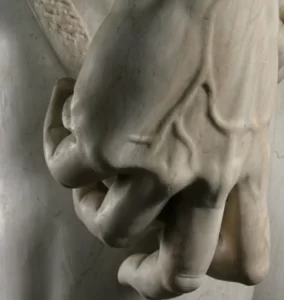Ord Om ordet
Feria iv, uke ii (2)
Engelsk tekst:
1 Samuel 17:32-33, 37, 40-51: I come against you in the name of the Lord.
Mark 3:1-6: They began to plot, discussing how to destroy him.
When God brought Israel out of Egypt, he chose as their guide a man ‘slow of speech and slow of tongue’ (Ex 4:10), no leader of Churchillian stature. When Gideon launched a decisive attack on the Midianites, who lay in wait ‘as thick as locusts’, he had Israel’s army reduced to a mere 300 men (Judges 7). Today, in a duel that lays the foundation for Davidic rule, a child is pitted against a giant, the mere sight of whom had been enough to cause all Israel to flee, ‘very much afraid’ (1 Sam 17:23).
At stake is more than divine predilection for the underdog. We are faced with a recurring aspect of divine pedagogy.
Even we who believe in God often live as if God did not exist. We make plans, develop strategies, bite our nails anxiously, as if all depended on us. We easily forget that the God we profess is a living God, who acts. We put our trust in chariots and horses (cf. Psalm 20:7) or their modern equivalents: counsellors and experts.
To remind us that he is real, God has recourse to the unexpected and improbable. He enables us to do what we couldn’t possibly manage on our own. His strength finds expression, indeed is made perfect in our weakness (2 Cor 12:9).
The manifestation of God’s incarnate Son is consistent with divine interventions in the First Covenant. Christ chooses to be undefended, exposed. We’ve just celebrated Christmas, astonished — again — at God Almighty’s entry into a state of utter dependence.
In the incident put before us today, this pattern is played out in Jesus’s adult life. When the Lord performs a healing on the sabbath, hostility fills the atmosphere of the synagogue like smoke. Yet Christ is unaffected by it, unafraid. He simply does what he has to do, then goes on his way, doing good, serenely aware that his opponents plot his downfall.
We live in times in which there is much resistance to what we stand for as Catholics. Our strength diminishes, our numbers are reduced. Seminaries stand empty, monasteries close — yet not so long ago everything seemed full of promise! Many give way to discouragement. Some cede to murmuring, that most tedious of vices.
What if instead we reconsider? What if we take the story of David, a lad armed with five smooth stones against Philistine might, at face value? Could our present trials be a chance to know that God is God?
‘I come against you’, says David to his armoured foe, ‘in the name of the Lord of Hosts […], that all the earth may know that there is a God in Israel.’ Everything depends on whether that affirmation carries our own enterprise. If instead what we seek is affirmation and comfort for ourselves, then we’ve had it. Then we shall already have surrendered to Goliath.
David’s hand holding a smooth stone — a detail from Michelangelo’s sculpture. Photo NBC News.

